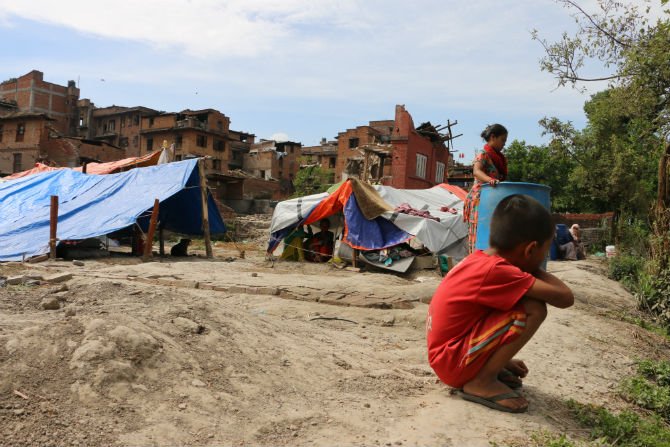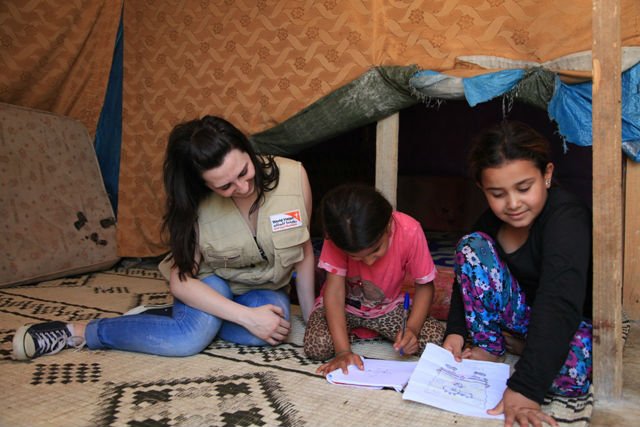Humanitarian aid workers work tirelessly to help those less fortunate around the world. They work long hours, sacrifice time with their families and loved ones to be with others, and care for the world’s most vulnerable, often overlooked populations.
Though the nature of their work varies widely, the stories of humanitarian workers reveal commonalities shared by all those who have given their lives in service to others.
August 19 is World Humanitarian Day. The UN invites everyone to #ShareHumanity by celebrating these unseen heroes and their stories, so we celebrate by sharing these realities any humanitarian worker will understand, as told by four aid workers around the world.
You’re afraid often, but never too afraid to keep your focus on what’s important.
“Through the debris and chaos I needed to focus on how my work could make a difference there, especially to children… When you work in the midst of a disaster it is important to focus and not let your own fears affect you. I was scared, but other people lost their homes, jobs and family members.”
-David Munoz, working the Nepal earthquake response

You are constantly blown away by the beauty of the human spirit…
“The food cuts are affecting this family. They haven’t eaten meat in 7 months and they are increasingly going into debt to secure their food necessities… [but ] in spite of their difficult living conditions, they still have a sense of humour, especially the father who smiled a lot and expressed the family’s difficulties using humour. In addition to that they were very hospitable and offered us tea.”
“It felt like a sauna in there. It was such a nice surprise when Rasha made me a fan. This act of kindness was very touching. She has to live in these harsh conditions every day. I'm still thinking about how they deal with this heat and their challenges with water.”
-Therese Boulos, working with a Syrian refugee family in Lebanon

…and constantly heartbroken by all people must bear in the world.
“Last winter was one of the toughest winters. The temperatures dropped to ten below zero. We did a distribution in winter and we were freezing cold even though we were wearing proper winter clothing. It must have been so cold for the refugees living in those conditions with only thin clothes, living in a tent and sometimes without a stove or heater and not very warm blankets. It must have been very difficult.”
-Therese Boulos


You’re always surprised by how much you have to learn, even with the most extreme training for your job.
“I used to think that I knew everything about displaced people and refugees because I had experienced similar situations at various times during my life. I was born an Iraqi refugee in Iran… My belief that I know everything about displaced people started to disappear when I became an aid worker with World Vision and worked with these people, whom I have identified with myself. I still have so many things to learn about the realities of life, especially in Iraq.”
-Ammar, aid worker in Iraq

You recognize that kids are pretty much the same, no matter the circumstances.
“Rasha and Shahed have no electricity to watch their favorite cartoon show, SpongeBob SquarePants.”
-Therese Boulos


You gladly spend your life using your gifts to help other people.
“Being a humanitarian worker means putting my talents towards people who are affected by emergencies, especially children who are the most vulnerable in time of crises."
-Jose Nelson, aid worker in El Salvador

Your job can be overwhelming, but you wouldn’t trade your experiences for anything.
“I have many unforgettable experiences. I remember being part of the response team in the South East Asia tsunami, considered the largest humanitarian operation in recent history. I was also deployed to help after the earthquakes in Haiti and Chile. These are all experiences that have reaffirmed my vocation and calling to humanitarian service."
-Jose Nelson
“Every day, there is something to learn about how to be a better person; the key is patience, faith and hope. Hope is important. It is what keeps me going.”
-Ammar

And the best part of your pay doesn’t come on your paycheck.
"The most rewarding part of my job is when I see the smiles on the faces of children and parents.”
-Jose Nelson

“The best reward ever is each smile of a child that feels secure, who is in a place outside any danger and can play and sleep in comfort.”
-David Munoz

“One of the best things about my job is seeing the smile in a child’s eyes.”
-Therese Boulos

To all those sacrificing their time and giving their service to others around the world, we thank you.
Thank a humanitarian worker today by keeping them in your thoughts and prayers, and don’t forget to #ShareHumanity by reading and sharing one of these four courageous workers’ stories.